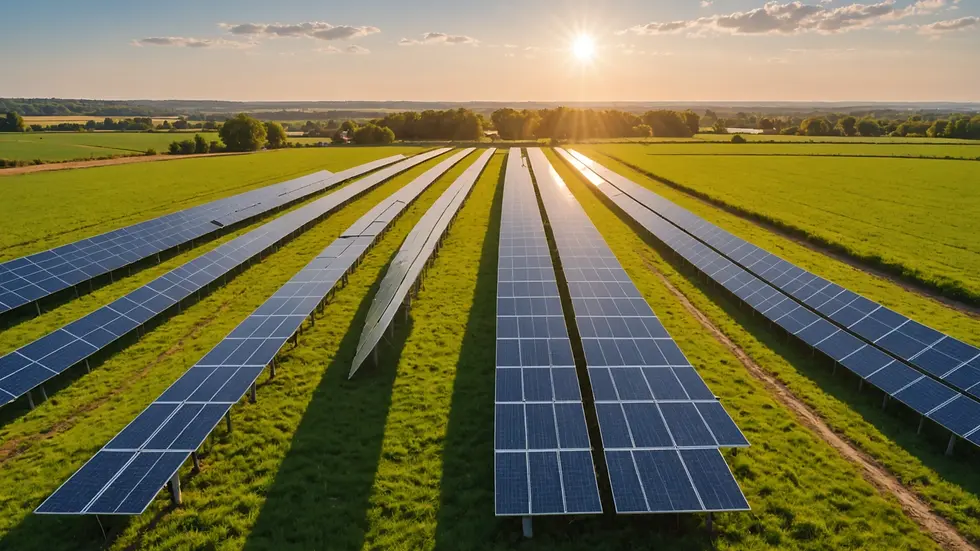How Green Technology is Disrupting Industries and Paving the Way for a Sustainable Future
- Aaron Levin
- Jan 9
- 4 min read
The urgency for sustainability has never been more apparent. A Green Tech Revolution is underway, and climate change and environmental degradation are becoming undeniable realities.

This revolution is reshaping traditional industries and providing innovative solutions that cater to a more sustainable future. From harnessing renewable energy to adopting energy-efficient technologies, green tech is essential for companies eager to adapt and thrive in today's world. Let's explore how green technology transforms various sectors, its remarkable impact on carbon emissions, and the bright prospects for a sustainable future.
Innovative Green Technologies Disrupting Traditional Industries
Green technologies are causing significant shifts across multiple sectors. In the energy sector, for example, renewable sources like solar, wind, and hydropower are replacing fossil fuels at an unprecedented rate.
Reports indicate that in 2022 alone, the U.S. saw a 20% increase in solar generation, which helped reduce carbon emissions by nearly 80 million tons. Such advancements lessen fossil fuel dependency and open new business avenues.

Meanwhile, numerous companies are implementing sustainable manufacturing practices through energy-efficient technologies.
For instance, GE's digital wind farm projects have resulted in a 10% increase in efficiency, substantially reducing resource consumption across the board.
The Internet of Things (IoT) drives smart manufacturing, allowing companies to optimize production processes and minimize energy use, ultimately leading to cost savings.
The transportation sector is also experiencing a significant shift with the rise of electric vehicles (EVs). In 2023, EV sales accounted for 14% of total car sales in the U.S., representing a remarkable 30% increase from the previous year.
This growth is supported by advancements in battery technology and expanding charging infrastructure. The transition to EVs significantly lowers carbon footprints and enhances urban air quality compared to conventional gasoline vehicles.
Agriculture is not left behind either. Precision agriculture tools like satellite imagery and drones enable farmers to make data-driven decisions. This technology optimizes resources like water and fertilizers, increasing crop yield by 15% or more while minimizing environmental impacts. Such sustainable practices not only improve food security but also protect our ecosystems.
Impact of Green Tech on Reducing Carbon Emissions
The role of green technologies in combating climate change is pivotal. The energy sector is responsible for significant global greenhouse gas emissions. By transitioning to renewable energy, we can achieve drastic reductions.
For example, a single solar farm can offset around 2,000 tons of CO2 annually, showing how impactful these technologies can be when deployed on a larger scale.
Recent data reveals that countries investing in renewable energy experience more significant reductions in air pollution. A 2023 study demonstrated that nations that increased their renewable energy capacity by at least 10% saw a corresponding 25% drop in respiratory diseases linked to air quality issues.
Organizations that adopt energy-efficient practices often enjoy significant operational cost savings, sometimes up to 30%.
This not only reduces their environmental impact but also enhances their profitability. Many businesses now consider carbon footprint reduction bright, realizing it leads to longer-term success.
Moreover, green technology plays an essential role in conserving natural resources. Businesses prioritizing sustainability through energy-efficient practices help ensure the effective use of our planet's resources, contributing to a more sustainable future.

Future Prospects of Sustainable Tech Integration in Businesses
As climate change continues escalating, sustainable technology's future in business looks brighter. Expanding legislation and increased public awareness are driving organizations to adopt greener practices.
Innovations like carbon capture and storage (CCS) are emerging as game-changers, especially for high-emission industries such as cement and steel. Estimates suggest CCS could reduce emissions by 1.5 billion tons per year globally, providing a viable path to creating greener industrial processes.

As consumers increasingly prefer sustainable brands, companies are under pressure to innovate. A recent survey found that 67% of consumers are willing to pay more for sustainable products. Companies that successfully adapt will improve their brand's reputation and tap into an expanding market niche.
Additionally, the digital revolution is enhancing green tech integration. Big data analytics allow for better assessment of environmental impacts, guiding companies to make more efficient decisions. Blockchain technology can foster transparency in supply chains, helping businesses track sustainability across their operations.
Anticipating future collaborations between tech firms, venture capitalists, and governments is crucial for promoting green innovations. Investment in research and development can lead to groundbreaking advancements that support a low-carbon economy.
Embracing the Green Tech Revolution
The Green Tech Revolution is reshaping industries and promoting a global movement toward sustainability. The innovative solutions from this movement offer practical pathways for reducing carbon emissions and conserving natural resources.
To remain competitive, business leaders must recognize the importance of integrating sustainable technology into their operations. By doing so, they can positively impact the environment, cater to consumer demands, and ensure enduring profitability. Green tech's potential to transform industries and forge a sustainable future is expansive and exciting.
Embracing sustainability is essential, not just for our present but also for the well-being of future generations. Understanding these concepts can cultivate significant societal changes, making a greener world a realistic goal.



Comments